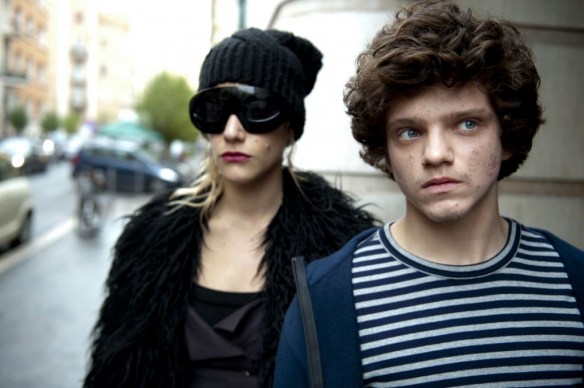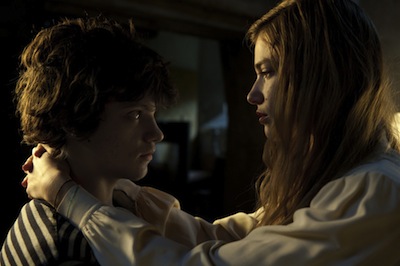By providing your information, you agree to our Terms of Use and our Privacy Policy. We use vendors that may also process your information to help provide our services. This site is protected by reCAPTCHA Enterprise and the Google Privacy Policy and Terms of Service apply.
Bernardo Bertolucci on Returning to the Director’s Chair and Why He’s Excited About the Digital Future
Eric Kohn

Bernardo Bertolucci’s name conjures up memories of tense dramas involving dark subject matter, philosophical intrigue and political subtext, from “Last Tango in Paris” to “The Conformist” and later efforts like “The Dreamers.” With those precedents in mind, the director’s first credit in a decade, “Me and You,” may come as something of a surprise: Adapting Niccolo Ammaniti’s novella, the movie almost exclusively takes place in a basement, where drug addict Olivia (Tea Falco) spends time with her curious younger brother Lorenzo (newcomer Jacopo Olmo Antinori, in an Antoine Doinel-like role marked by early teen excitement). As the pair hang around and talk about life, Lorenzo is initially smitten with his sister’s hip facade, before confronting its more dangerous extremes. With a soundtrack that includes Arcade Fire and a largely bittersweet tone sustained throughout, “Me and You” showcases a side of Bertolucci we’ve never quite seen before, partly because he’s been out of commission for so long.
After a series of back problems, the filmmaker was relegated to a wheelchair, which is where he sat for the duration of production on “Me and You.” Yet the resulting movie, in tune with the age of its subjects, has a youthful quality that suggests a new phase for the filmmaker. He spoke with Indiewire over a crackly phone connection from Italy, anticipating the limited release of “Me and You” in New York on Friday.
So what’s it’s like to finally have a movie opening in the United States after 10 years?
Thank god somebody in the states can see the film. It was Dan Talbot who opened “Before the Revolution” at the New Yorker theater in 1964. And now he’s showing “Me and You” at Lincoln Plaza. So Dan Talbot has been my champion for 40, that’s — bella.
What did it feel like to work behind the camera again?
On the one hand it was a miracle to be able to do it again. On the other hand, shooting films is what I’ve done all my life and so it was normal for me, apart from the fact that the POV was a young child. Other than that, everything was so easy and it came out flowing. As you can imagine, I was incredibly excited to be able to come back again with a movie after having thought for a few years that it was a closed chapter. I was so happy and surprised when the movie happened.
 This is a much smaller, contained work than anything else in your career.
This is a much smaller, contained work than anything else in your career.
It’s just another one of my movies. Very often I focus on the space of an apartment. Think of “Last Tango in Paris,” think of “Besieged,” think of “The Dreamers.” So it has always been in my past a kind of moment where I was feeling to lose myself somewhere. And I loved to be closed somewhere. So I found it familiar to be working in this setting.
Yet it has a more uplifting quality than the others.
And that’s why, when the brother and sister have reached the light of the new day, I couldn’t accept the ending of the novella, that the girl dies. I love the novella, but I didn’t like that part. It was so banal. In every movie I’ve seen, if there’s a junkie, they’re dead by the end of the movie. They all have to die at the end. I told Nicolo that I wanted her to be alive at the end. I want that hope. The more I grow older the more I am optimistic.
 You don’t often work with child actors. What was different for you about that experience?
You don’t often work with child actors. What was different for you about that experience?
First of all, I find it fantastic to have somebody that age in front of my camera. That’s why I shoot in chronological order. At the beginning of the movie, he was a certain height; by the end, he’d grown at least two centimeters. That’s amazing to me. It’s like if the camera was catching life at work. The boy is growing up in front of the camera. Jean Cocteau said, “Cinema is life at work.” That’s why I love to shoot with young actors. You see them in a short time of shooting a movie changing. That is really the feeling of a life which goes beyond history or the story of the film. It’s like life being documented, it’s a document of coming of age.
I don’t know at all that generation. The boy had only watched one of my films, “Novecento” [“1900”], because the character is named Olmo, like him. So I interviewed this boy about his feelings, about the music he listened to, and he’s somebody who’s full of thoughts but kind of dry in affection. That’s why he’s able to appear so weak, he’s able to enjoy his loneliness. That’s why he feels invaded when his sister comes.
What’s your take on Italian cinema these days?
I feel better about it. For a long time, let’s say four or five years ago, I felt that Italian cinema was in agony. Then, there were two films — “Gomorrah” and “Il Divo” — and I felt, “Here is something new, here is something strong, here is something I really like.” These two directors, Paolo Sorrentino and Mateo Garrone, are really powerful. I think that “The Great Beauty” is answering questions that films did 50 years ago. It was a great film. I like all of Sorrentino’s movies. I feel much better now. There are other movies coming recently which I’m sure will get attention all over. What can I tell you? I’m reassured—I think Italian cinema is back.
How do expectations inform what you want to do next?
I don’t look back. Of course, the way of seeing movies 40 years after they were made is very different — but in a good way, because it has to be different. Cinema is going through extraordinary changes as it did in the past, going from silent to sound, and black and white to color. Cinema is again changing. I’m very much attracted to digital, I must say, even if “Me and You” was made on film. I can’t wait to do something digitally. I think that we have to be happy that cinema is changing.
 What sort of relationship do you think younger audiences have to your films today?
What sort of relationship do you think younger audiences have to your films today?
I’m curious, I’m sure that young audiences of today can see my old movies in a different way. I wish could listen to what young people think, because what they like or what they don’t like will be connected to something different.
You’ve spoken of your affinity for television series like “Breaking Bad” in other interviews. What appeals to you about contemporary TV?
I’ve been watching these American TV series for some time now, so I find that there is a new freedom in comparison with movies. When Walter White puts down the phone, he can spend 10 seconds thinking. That passage of time is different from the cutting, the editing, that is so aggressive in movies. You cannot have a character just walking across the landscape. I think it’s fantastic to have the freedom to take time.
What’s your next move?
I have an idea I love but it’s too complex and spectacular, too much of a big production. Now I’m trying to see if I can impress this big production on a theater chamber piece. I dream of a movie of mine which is “camera schpiel.” In German that means “chamber theater.”
Sometimes, you know the idea is that one, but you can’t finish it. That’s what I’m looking for now — the shape of an idea.
By providing your information, you agree to our Terms of Use and our Privacy Policy. We use vendors that may also process your information to help provide our services. This site is protected by reCAPTCHA Enterprise and the Google Privacy Policy and Terms of Service apply.















